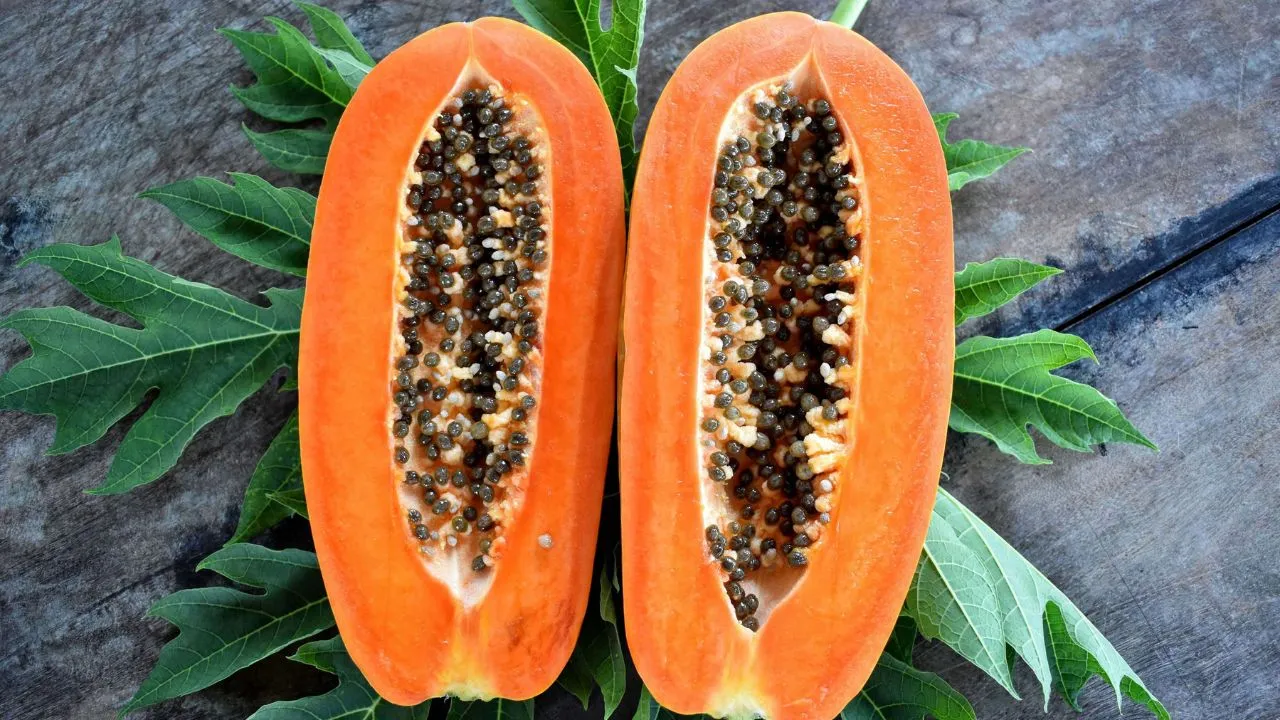Elevate your well-being with the tropical goodness of papaya! Discover its 10 Amazing health benefits of Papaya and savor the sweet, nutritious joy it brings to your diet.

Papaya, a tropical gem, transcends its delicious taste to offer a myriad of health benefits and culinary possibilities. From combating parasites to tantalizing smoothies, this article delves into the diverse facets of papaya—its seed benefits, enzyme wonders, nutritional richness, and delectable recipes.
10 Health Benefits of Papaya
Papaya is a tropical fruit that has many health benefits. Here are 10 of them:
- Papaya is rich in vitamin C, which can boost your immunity and prevent scurvy. Vitamin C also helps in the production of collagen, which is important for your skin and connective tissues.
- Papaya contains antioxidants, such as carotenoids and lycopene, that can protect your cells from oxidative stress and inflammation. Oxidative stress and inflammation are linked to many chronic diseases, such as cancer, heart disease, and Alzheimer’s.
- Papaya has a high fiber content, which can lower your cholesterol levels and reduce your risk of heart disease. Fiber also helps in digestion and prevents constipation.
- Papaya has a low glycemic index (GI), which means it does not spike your blood sugar levels. This is beneficial for people with diabetes, as it can help them control their blood glucose levels.
- Papaya contains an enzyme called papain, which can break down proteins and help tenderize meat. Papain can also improve wound healing by removing dead tissue and preventing infection.
- Papaya is a good source of vitamin A, which is essential for your vision and eye health. Vitamin A also supports your immune system and helps fight infections.
- Papaya is a good source of folate (vitamin B9), which is important for your brain and nervous system. Folate also helps in the production of red blood cells and prevents anemia.
- Papaya is a good source of potassium, which is an electrolyte that helps regulate your blood pressure and fluid balance. Potassium also supports your muscle and nerve function.
- Papaya is low in calories, which can help you lose weight or maintain a healthy weight. Papaya can also make you feel full for longer, as it has a high water content and fiber content.
- Papaya has a sweet and musky flavor that can enhance the taste of your dishes. You can eat papaya raw or cooked, or use it in salads, smoothies, desserts, and sauces.
These are some of the health benefits of papaya that you can enjoy by adding this fruit to your diet.
Papaya Seed Benefits:
Combatting Intestinal Parasites: Papaya seeds, a traditional remedy, are believed to possess antiparasitic effects. Studies suggest that certain compounds in the seeds aid in eliminating harmful organisms from the digestive tract.
Liver Protection: Compounds like flavonoids and phenolic acids in papaya seeds may contribute to liver health, offering potential protective effects on this vital organ.
Anti-Inflammatory Properties: Bioactive compounds in papaya seeds may harbor anti-inflammatory properties, providing relief from inflammatory conditions and promoting overall well-being.
Papaya Enzyme Benefits:
Digestive Powerhouse: Papain, a key enzyme in papaya, aids in breaking down dietary proteins, reducing bloating, gas, and indigestion.
Wound Healing: Topical application of papaya enzyme creams or ointments is thought to facilitate wound healing by removing dead or damaged tissue.
Skincare Marvel: Papaya enzymes, especially papain, are sought after in skincare products for their exfoliating properties, promoting smoother and radiant skin.
Nutritional Richness of Papaya:
A medium-sized papaya packs a nutritional punch, offering over 200% of the daily recommended vitamin C intake. It is also a rich source of folate, vitamin A, fiber, copper, magnesium, potassium, and pantothenic acid.
Nutrient Content per Serving:
- Calories: 119
- Protein: 1.3g
- Carbohydrates: 30g
- Fat: <1g
- Dietary Fiber: 4.7g
- Sugar: 21.58g
Things to Watch Out For:
While generally safe, some individuals may experience allergic reactions to papaya. Those monitoring sugar intake should consume papaya in alignment with their health needs.
How to Eat a Papaya:
When selecting a papaya, opt for slightly soft ones with red or orange skin. Unripe papayas can ripen at room temperature. To consume, cut it open, scoop out the seeds, and relish the orange interior. Papaya finds its way into various recipes like salsa, jam, smoothies, and salads.
Recipes:
- Papaya Salad:
- Ingredients: Green papaya, garlic, Thai bird’s eye chilies, cherry tomatoes, roasted peanuts, dried shrimp, fish sauce, palm sugar, lime wedges.
- Instructions: (Detailed steps provided in the original article).
- Papaya Smoothie:
- Ingredients: Ripe papaya, banana, Greek yogurt, milk, honey, vanilla extract, ice cubes.
- Instructions: (Detailed steps provided in the original article).
Conclusion:
Papaya is not just a fruit; it’s a versatile powerhouse offering health benefits, culinary delights, and skincare wonders. Whether savoring its sweetness or exploring its medicinal facets, incorporating papaya into your routine unlocks a world of goodness. From seed to smoothie, let papaya weave its tropical magic into your lifestyle.
Papaya FAQs:
Is it good to eat papaya every day?
Papayas are generally safe but should be consumed in moderation, considering individual allergies or dietary restrictions.
When should you eat a papaya?
Opt for ripe papayas with red or orange skin, slightly soft to the touch but not overly so. Detailed guidance on picking and eating papayas is available in the original article.

